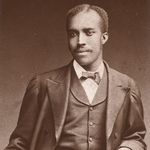The Nathan Francis Mossell University Professor
 This Chair honors the first Black graduate to earn a medical degree from Penn. Nathan Francis Mossell, MD (1856-1946), of the class of 1882, went on to lead the founding of the Frederick Douglass Memorial Hospital and Training School in Philadelphia. The second Black hospital in the U.S., this institution became a leading training center for Black nurses and physicians. The University established the Professorship in 2017 as a tribute to Dr. Mossell’s achievements.
This Chair honors the first Black graduate to earn a medical degree from Penn. Nathan Francis Mossell, MD (1856-1946), of the class of 1882, went on to lead the founding of the Frederick Douglass Memorial Hospital and Training School in Philadelphia. The second Black hospital in the U.S., this institution became a leading training center for Black nurses and physicians. The University established the Professorship in 2017 as a tribute to Dr. Mossell’s achievements.
Dr. Mossell’s father, whose grandparents had been enslaved, ran a successful brick manufacturing business in New York state. Dr. Mossell earned his undergraduate degree from Lincoln University. He took second honors at both Lincoln and Penn. Due to the difficulties Blacks then encountered in securing internships in this country, Mossell travelled to England to continue his training at Guy’s, Queen’s and St. Thomas’ Hospitals in London. He returned to Philadelphia to start a private practice in 1888. After overcoming opposition, he became the first Black physician elected to the Philadelphia County Medical Society.
In part to provide Black physicians and nurses with educational opportunities, Dr. Mossell took the lead in forming the Frederick Douglass Memorial Hospital and Training School in 1895. His former Penn professors (including Agnew, Tyson, Pepper, and Leidy) were among the initial contributors. Dr. Mossell served as Chief of Staff and Medical Director for nearly 40 years. Among his endeavors to empower Blacks, Dr. Mossell was a co-founder of the Philadelphia Academy of Medicine and Allied Sciences (an association for African Americans in medicine) in 1900. He was also a Founder and Director of the Philadelphia branch of the National Association for the Advancement of Colored People.
Dr. Mossell was part of a family which included his niece Sadie Tanner Mossell Alexander, who earned her PhD from Penn in 1921 and became the first Black person to obtain a PhD in economics in the U.S. She was also the first Black woman to graduate from Penn’s Law School. She was married to Raymond Pace Alexander, the first Black judge appointed to the Philadelphia Court of Common Pleas.
 Current Chairholder
Current Chairholder
Konrad Kording, PhD
Konrad Kording, PhD is the inaugural Nathan Francis Mossell University Professor. He holds joint appointments in the Department of Neuroscience in the Perelman School of Medicine and the Department of Bioengineering at Penn Engineering. Dr. Kording describes himself as a science coach, collaborator, and transdisciplinary optimist. His work has brought new insights to many areas of biomedicine including the study of motor control and computational neuroscience. Recently, Dr. Kording has become a strong advocate for equity in the sciences and open science policies.
Dr. Kording earned his PhD in physics from the Federal Institute of Technology in Zurich, followed by postdoctoral appointments at the Collegium Helveticum in Zurich and at University College London and as a Heisenberg Fellow at MIT. He joined the faculty at Northwestern University and the Rehabilitation Institute of Chicago, where he was a professor of physical medicine and rehabilitation, physiology, and applied mathematics.
Springing from its roots in the study of neural systems and computational cognitive science, over time, the Kording lab has made an impact across many fields including:
-
The Neuromatch movement: Dr. Kording co-founded Neuromatch, a non-profit organization that advocates for equity in and open access to neuroscience research. Neuromatch makes high-level education and conferences available for free to thousands of students across more than 100 countries.
-
How to write papers: The writing guide created by the team has been used by hundreds of thousands of people. At more than10k tweets, it is possibly the most tweeted about paper across science.
-
Deep learning and brains: The lab has outlined a path to link these two areas and developed methods of analyzing neural data and obtaining large neural datasets.
-
Uncertainty in the brain: The team has extensively investigated how the brain represents what it does not know.
-
Predicting professor careers: The lab has introduced data-driven, multifaceted predictions to the analysis of academic careers.

